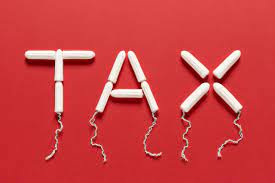Tampon Tax

April 28, 2021
Expensive cars, private jets, yachts, and jewelry. Tampons, pads, and diapers. A stark contrast exists between the necessity of the former versus the latter and, yet, both incur a federal luxury tax.
The luxury tax was passed by Congress in 1991 as a way to target products deemed nonessential and those only accessible to the wealthiest of the nation. Within the law lies a twofold system: the “sin” tax and the “wealthy” tax. The sin tax incentivizes consumers to shy away from products such as cigarettes and liquor. In doing so, the government is able to discourage purchases of these items and gain profit from those who continue to buy them. The wealthy tax imposes a higher tax on items only within the grasp of consumers of the highest economic class: luxury cars, jets, yachts, and jewelry.
A tax meant to gain revenue for the government from only a small portion of the population has slithered its way into the lives of every woman. Essential items for anyone who is subject to a menstrual cycle, are taxed as luxury, lowering their accessibility, and ultimately gaining unjust profit for the government.
Accessibility for menstrual hygiene products is already a common issue. Even in wealthier communities, like Ashburn, schools do not provide free pads or tampons. Dispensaries in girls’ bathrooms charge between 25 and 75 cents for these commodities and raise revenue for the schools, leaving girls and women without essential items when they are needed the most. “Tampons and pads should be free in schools. It’s completely unfair girls have to pay for something they can’t control,” says Briar Woods Senior, Saanvi Kancherla.
According to a study done by the State Assembly Democratic Caucus, women in California pay around $7 per month for 40 years in taxes for feminine hygiene products. Although this may seem like a small price to pay, the government collects $20 million in taxes from women across the country annually.
States like Minnesota, Pennsylvania, and New Jersey recognized the issue at hand and exempt menstrual hygiene products from the sales tax years ago. Following class-action lawsuits arguing for the injustice in placing a luxury tax on essential items, California, Ohio, and Florida have followed suit. Since 2016, 15 states have exempt menstrual products from a tax, but many states have yet to take action.

